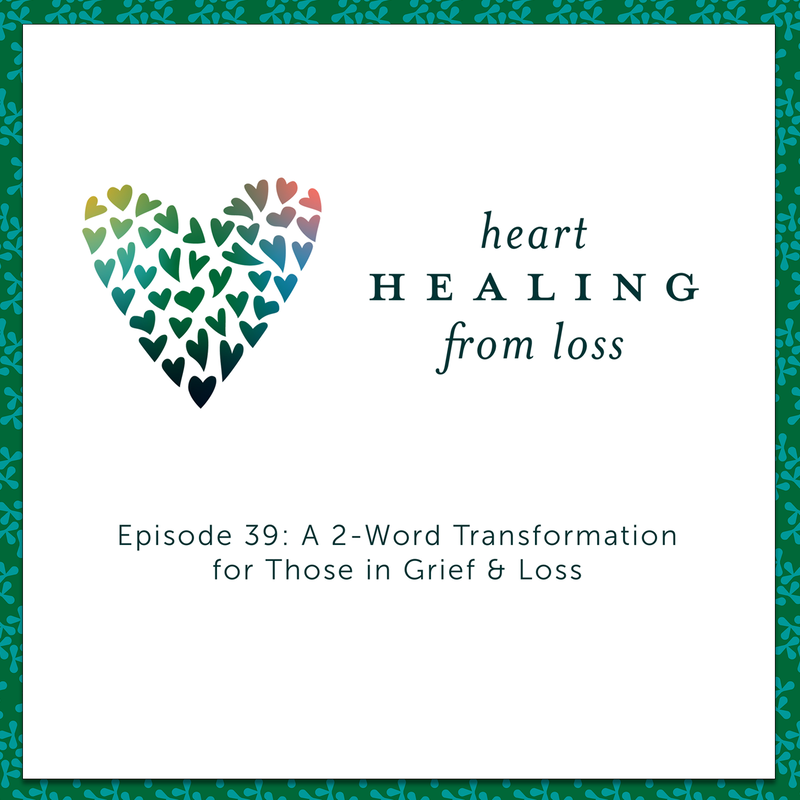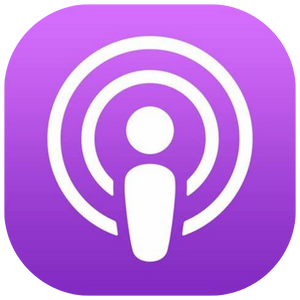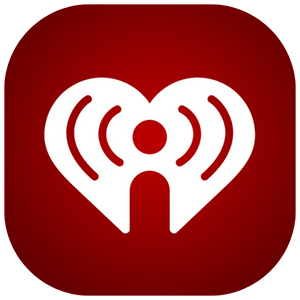Episode 39: A 2-Word Transformation for Those in Grief and Loss
|
When you experience a loss, you get asked — by very well-intended friends, family, and others — how you're "doing."
It can get exhausting trying to think of an answer. "I'm fine," is far from accurate and not fooling anyone. Or it might be true but makes us feel guilty for being true, even if that "fine" is extremely transitory. No one wants to hear that you're "terrible" or "sad" or "lousy," or maybe they're just fine hearing it, but you feel worse saying it. You didn't even brush your teeth today; how do you answer the question, "How are you?" without dragging them down with you? |
Unknot Your Grief
These are the knots grief and loss can tie us up in. Grief Coach Wendy Sloneker is ready to help you get unknotted. You can make a shift in how you think about every piece of progress you make, even if the progress is as small as brushing your teeth today.
You're Invited
Give yourself the time to listen and steep in the self-care, then visit Wendy at wendysloneker.com for a complimentary consultation.
These are the knots grief and loss can tie us up in. Grief Coach Wendy Sloneker is ready to help you get unknotted. You can make a shift in how you think about every piece of progress you make, even if the progress is as small as brushing your teeth today.
You're Invited
Give yourself the time to listen and steep in the self-care, then visit Wendy at wendysloneker.com for a complimentary consultation.
As seen on: |
|
Full Episode Transcript
Wendy Sloneker
You are listening to the heart healing from loss podcast with Wendy Slonaker. Episode 39.
Hey, everyone, welcome in Welcome back, we've got a candle burning about a favorite beverage, it happens to be cold. I'm recording at 11 am on a Tuesday, which is a little bit different from me, I'm trying to couple different things out and shaking things up.
Which, if you are in a season of grief and loss, that can be challenging to just switch the smallest things around just a little bit. And it can be helpful. It's not always helpful I trust, I trust your inner guide to let you know what feels like the next right thing. Even and no matter how tiny.
I want to talk a little bit today about self-talk in grief and loss. Oftentimes, we try to tell ourselves or our mind, there's a voice inside that says, We should not be feeling how we're feeling or we've been feeling sad or angry or bitter or resentful. We've been feeling fill-in-the-blank for too long, it's taking longer than we would like it and that's understandable. It's really understandable, we haven't been taught how to feel our feelings, especially if they're negative. Shoot, most of us myself included until recently couldn't identify the feelings that I was feeling. And sometimes it still takes me a little while to figure out what I'm feeling. This is a right.
This is also a natural part of the natural response to processing loss of many kinds. Many, as a reminder, there are 40 Plus, more than 40 life events, just plain old life that gets lived that can bring about feelings of loss. So if you're carrying around multiple losses that have not been processed emotions that have not been processed, you may not know how you're feeling other than not great. And that's enough.
That's enough, however, and what I would like to talk about is a two-word transformation, which, if that sounds like too much, I'm excited to share with you, it can be broken down into a one-word transformation. Now, let me offer what it is I'm sharing about what a transformation is. I feel like when we are in spaces, and moods and seasons of loss, where every day is, can seem like a chore. We don't know how we're gonna get through the day, but somehow we do and then we did, and then we're having another day that feels a lot like the day before. Anyone, anyone? Does that resonate? Just checking. Because that has been my feeling.
So when we're in that space, a little shift is what I'm going to count as a transformation. Yes, I am. No burning bushes required. I haven't to be friends and fans of landscaping. So burning bushes are not my thing. But a little shift in a time of loss can feel like a transformation. Here's the thing. We often do not allow it. So one, can you play the game with me for the short time? And whenever you think about it, again, to allow a little shift to be a transformation. If it feels like it, it really sort of lifts you out or moves you forward. It doesn't have to feel great. It can just feel a tiny bit better. And that's enough. That's enough to work with. That's enough to play with. That's enough to, if you choose because I'm not here to take anything away from you you've already experienced loss. What I want to offer is an additional tool that you can use that you can count as evidence, feeling a little bit better can be evidence that something else can happen. There can be a shift.
Is it what you want? Maybe not. And maybe it's just different enough to help. Okay? The meat of the party, if you will, the pod party that we're having right now, I did say I had a beverage. Do you have one? Okay.
The two-word transformation, it's actually conceptional thing. So what I want you to look for, in your self-talk, either just in your mind, or as you talk to friends, family, loved ones, coworkers, dog walker, or whoever is in your realm. When do you use the word only? And I asked him this, just be aware of it, just sort of find out for yourself from yourself. When you're saying this as a way, it's the word only. And it's used in a way that diminishes what you're actually doing.
It's actually a way that we sometimes beat ourselves up, even though it's hard enough already. So I want you to take a look around as you're going about your life and your day. And your moments, when am I saying only to myself, you may be thinking you're not doing enough because we in our society, really place a lot of external value on productivity.
So if you say something to yourself, that sounds a little bit like, I can only work about 15 minutes before I lose focus completely and feel exhausted. Or I only did this today, we totally understand that it without grief or without loss or challenging feelings of change, you are able to accomplish more or different or higher quality, whatever it is. Grief does slow us down. It's part of the healthy, healthy, it's healthy to have this coping mechanism, your systems are protecting you by offering fatigue, what's going on is if you're in a space where your most recent change or loss is that it doesn't make sense. You're there's a part of your brain that's working extra hard and taking up a lot of resources, calories, fuel, attention, these things, this is why tired.
This is why it's healthy to recognize it and respect it and honor it with the rest or the break that your body is asking for. It's working really hard to try to make sense of something that just may have turned your world upside down. So allowing it, I want you to look for the word only. This is especially true. Well shoot, it's just playing on especially true. And for those of you who are experiencing really acute grief, where it's so raw, and you're right in it, hey, I want to offer this for a little bit late or when there's a day where you're like, Hey, I'm now able to do a couple more things in a day. Or I'm actually willing to, you know, brush my teeth or these sorts of things like basic hygiene. I'm not joking. basic hygiene is often exhausting. For those in acute loss, when the world has been totally turned upside down, it is really difficult to even move your body to even get to the kitchen or to go from bed to the couch in order to be on it all day. It's a big deal.
So honoring that. But as I said, going back to look for the word only as a way where you're begrudging yourself, I only did this I can only do this. I want you to find a way and this is not an external or physical thing. Find a way to offer yourself the word already as a replacement of only. What? For example? Heck, yes.
So taking the example from earlier on, what was it? Oh, shoot, I can't remember it. So you know what I'm creating a new one right now. Let's say you offer yourself the words, I can only, you know, really focus and get any work done for about 15 minutes before I get exhausted and need to take a break.
When you find yourself doing this, I want you to, stop and just say, Okay, what else can also be true? One, I'm already aware of that 15 minutes is about my time, space, or capacity for work right now, before I need a little break. How am I going to fit, you know, sort of work with myself around? Not extended? Necessarily? How do I work with myself? The word I used was already, I'm already aware that this is my capacity. How can I work with myself around it?
It’s part of, the emotional sort of GPS, if you will. So being aware, does count in what you do with it, and how you work with yourself comes next. First, awareness and willingness to use the word already.
So let's say there's the other example of getting from bed to the couch. And that's all you got. It's Netflix the rest of the day, or it's, you know, maybe tooth brushing. So offering yourself instead of I only brushed my teeth today, how about, I've already brushed my teeth today. This is still true. It's the positioning, that is critical to what are we trying to achieve here. A tiny shift, that can be considered a transformation.
It totally counts when you count it. And I'm here to advocate that maybe it's already hard enough. Without, you know, you coming in with your mind and telling yourself that you're not doing enough when you're already doing as much as you can.
Thoughts, resonance, anyone? Do you need more examples? It made a big difference to me when my coach who I learned this from I learned this from two or three other coaches, but it was hardly mentioned this morning. She reminded me about already versus only and I think it's important for you to let it be tiny. Let it create a little momentum, let it shift a little bit, and see how you can practice it yourself with your own thoughts.
Your target is the word only. And the usage around it being derogatory, according to you know, how you use it against yourself. Taking your own side, and saying it's hard enough is a way of well, taking your own sun. It truly is. And so we need that because the external world doesn't know how to handle grief and loss. They think that three days for the loss of a child or loss of a parent and having three days leave is quote-unquote enough. Because it works out for their numbers. This is not about numbers. This is about you taking care of yourself.
And speaking to yourself, when you're already having a hard time is an important skill that is learnable. You can create your own shifts with those words. Your lookout is only and your replacement, just to find a way. Just let your brain look for a way to incorporate and integrate already as a replacement for only.
Yep, that's what I got. And it's a big deal. Maybe it's time for more support and not less. I'm in your corner. And I'll talk to you again next week. Okay, Thanks, friends. Take good care.
Hi, this is Wendy, thank you so much for being here and spending time with me for you. Yeah, the whole purpose of walking through grief and loss is to find out how to feel better.
Did you know there are tools and skills to be learned about how to do this? Yeah, for real, and I do it. Let's get on a connection call. It's a 45 minute Free call. We'd love to offer to you when you're ready. And we'll just see if we'd be a good fit to work together.
If you're ready for a little more support, and not less, and if you're ready to feel a little bit better, and to find out how to repeat these and how to learn these tools and skills. I'm ready for you.
Reach out through my website. Connect with me directly through [email protected] and we'll set it up. Heck yeah, we will. Alright, till then. Take really good care.
You are listening to the heart healing from loss podcast with Wendy Slonaker. Episode 39.
Hey, everyone, welcome in Welcome back, we've got a candle burning about a favorite beverage, it happens to be cold. I'm recording at 11 am on a Tuesday, which is a little bit different from me, I'm trying to couple different things out and shaking things up.
Which, if you are in a season of grief and loss, that can be challenging to just switch the smallest things around just a little bit. And it can be helpful. It's not always helpful I trust, I trust your inner guide to let you know what feels like the next right thing. Even and no matter how tiny.
I want to talk a little bit today about self-talk in grief and loss. Oftentimes, we try to tell ourselves or our mind, there's a voice inside that says, We should not be feeling how we're feeling or we've been feeling sad or angry or bitter or resentful. We've been feeling fill-in-the-blank for too long, it's taking longer than we would like it and that's understandable. It's really understandable, we haven't been taught how to feel our feelings, especially if they're negative. Shoot, most of us myself included until recently couldn't identify the feelings that I was feeling. And sometimes it still takes me a little while to figure out what I'm feeling. This is a right.
This is also a natural part of the natural response to processing loss of many kinds. Many, as a reminder, there are 40 Plus, more than 40 life events, just plain old life that gets lived that can bring about feelings of loss. So if you're carrying around multiple losses that have not been processed emotions that have not been processed, you may not know how you're feeling other than not great. And that's enough.
That's enough, however, and what I would like to talk about is a two-word transformation, which, if that sounds like too much, I'm excited to share with you, it can be broken down into a one-word transformation. Now, let me offer what it is I'm sharing about what a transformation is. I feel like when we are in spaces, and moods and seasons of loss, where every day is, can seem like a chore. We don't know how we're gonna get through the day, but somehow we do and then we did, and then we're having another day that feels a lot like the day before. Anyone, anyone? Does that resonate? Just checking. Because that has been my feeling.
So when we're in that space, a little shift is what I'm going to count as a transformation. Yes, I am. No burning bushes required. I haven't to be friends and fans of landscaping. So burning bushes are not my thing. But a little shift in a time of loss can feel like a transformation. Here's the thing. We often do not allow it. So one, can you play the game with me for the short time? And whenever you think about it, again, to allow a little shift to be a transformation. If it feels like it, it really sort of lifts you out or moves you forward. It doesn't have to feel great. It can just feel a tiny bit better. And that's enough. That's enough to work with. That's enough to play with. That's enough to, if you choose because I'm not here to take anything away from you you've already experienced loss. What I want to offer is an additional tool that you can use that you can count as evidence, feeling a little bit better can be evidence that something else can happen. There can be a shift.
Is it what you want? Maybe not. And maybe it's just different enough to help. Okay? The meat of the party, if you will, the pod party that we're having right now, I did say I had a beverage. Do you have one? Okay.
The two-word transformation, it's actually conceptional thing. So what I want you to look for, in your self-talk, either just in your mind, or as you talk to friends, family, loved ones, coworkers, dog walker, or whoever is in your realm. When do you use the word only? And I asked him this, just be aware of it, just sort of find out for yourself from yourself. When you're saying this as a way, it's the word only. And it's used in a way that diminishes what you're actually doing.
It's actually a way that we sometimes beat ourselves up, even though it's hard enough already. So I want you to take a look around as you're going about your life and your day. And your moments, when am I saying only to myself, you may be thinking you're not doing enough because we in our society, really place a lot of external value on productivity.
So if you say something to yourself, that sounds a little bit like, I can only work about 15 minutes before I lose focus completely and feel exhausted. Or I only did this today, we totally understand that it without grief or without loss or challenging feelings of change, you are able to accomplish more or different or higher quality, whatever it is. Grief does slow us down. It's part of the healthy, healthy, it's healthy to have this coping mechanism, your systems are protecting you by offering fatigue, what's going on is if you're in a space where your most recent change or loss is that it doesn't make sense. You're there's a part of your brain that's working extra hard and taking up a lot of resources, calories, fuel, attention, these things, this is why tired.
This is why it's healthy to recognize it and respect it and honor it with the rest or the break that your body is asking for. It's working really hard to try to make sense of something that just may have turned your world upside down. So allowing it, I want you to look for the word only. This is especially true. Well shoot, it's just playing on especially true. And for those of you who are experiencing really acute grief, where it's so raw, and you're right in it, hey, I want to offer this for a little bit late or when there's a day where you're like, Hey, I'm now able to do a couple more things in a day. Or I'm actually willing to, you know, brush my teeth or these sorts of things like basic hygiene. I'm not joking. basic hygiene is often exhausting. For those in acute loss, when the world has been totally turned upside down, it is really difficult to even move your body to even get to the kitchen or to go from bed to the couch in order to be on it all day. It's a big deal.
So honoring that. But as I said, going back to look for the word only as a way where you're begrudging yourself, I only did this I can only do this. I want you to find a way and this is not an external or physical thing. Find a way to offer yourself the word already as a replacement of only. What? For example? Heck, yes.
So taking the example from earlier on, what was it? Oh, shoot, I can't remember it. So you know what I'm creating a new one right now. Let's say you offer yourself the words, I can only, you know, really focus and get any work done for about 15 minutes before I get exhausted and need to take a break.
When you find yourself doing this, I want you to, stop and just say, Okay, what else can also be true? One, I'm already aware of that 15 minutes is about my time, space, or capacity for work right now, before I need a little break. How am I going to fit, you know, sort of work with myself around? Not extended? Necessarily? How do I work with myself? The word I used was already, I'm already aware that this is my capacity. How can I work with myself around it?
It’s part of, the emotional sort of GPS, if you will. So being aware, does count in what you do with it, and how you work with yourself comes next. First, awareness and willingness to use the word already.
So let's say there's the other example of getting from bed to the couch. And that's all you got. It's Netflix the rest of the day, or it's, you know, maybe tooth brushing. So offering yourself instead of I only brushed my teeth today, how about, I've already brushed my teeth today. This is still true. It's the positioning, that is critical to what are we trying to achieve here. A tiny shift, that can be considered a transformation.
It totally counts when you count it. And I'm here to advocate that maybe it's already hard enough. Without, you know, you coming in with your mind and telling yourself that you're not doing enough when you're already doing as much as you can.
Thoughts, resonance, anyone? Do you need more examples? It made a big difference to me when my coach who I learned this from I learned this from two or three other coaches, but it was hardly mentioned this morning. She reminded me about already versus only and I think it's important for you to let it be tiny. Let it create a little momentum, let it shift a little bit, and see how you can practice it yourself with your own thoughts.
Your target is the word only. And the usage around it being derogatory, according to you know, how you use it against yourself. Taking your own side, and saying it's hard enough is a way of well, taking your own sun. It truly is. And so we need that because the external world doesn't know how to handle grief and loss. They think that three days for the loss of a child or loss of a parent and having three days leave is quote-unquote enough. Because it works out for their numbers. This is not about numbers. This is about you taking care of yourself.
And speaking to yourself, when you're already having a hard time is an important skill that is learnable. You can create your own shifts with those words. Your lookout is only and your replacement, just to find a way. Just let your brain look for a way to incorporate and integrate already as a replacement for only.
Yep, that's what I got. And it's a big deal. Maybe it's time for more support and not less. I'm in your corner. And I'll talk to you again next week. Okay, Thanks, friends. Take good care.
Hi, this is Wendy, thank you so much for being here and spending time with me for you. Yeah, the whole purpose of walking through grief and loss is to find out how to feel better.
Did you know there are tools and skills to be learned about how to do this? Yeah, for real, and I do it. Let's get on a connection call. It's a 45 minute Free call. We'd love to offer to you when you're ready. And we'll just see if we'd be a good fit to work together.
If you're ready for a little more support, and not less, and if you're ready to feel a little bit better, and to find out how to repeat these and how to learn these tools and skills. I'm ready for you.
Reach out through my website. Connect with me directly through [email protected] and we'll set it up. Heck yeah, we will. Alright, till then. Take really good care.






